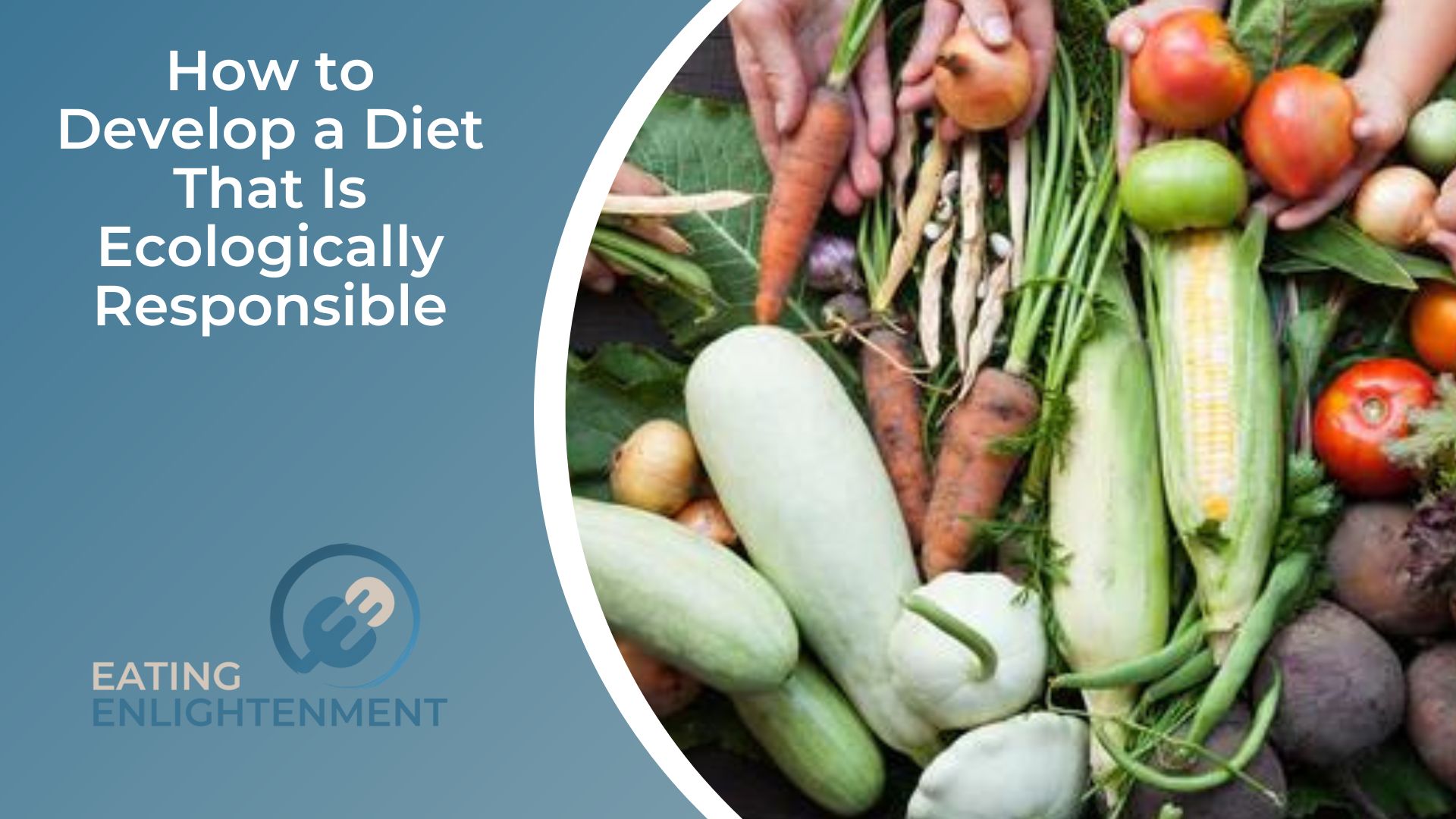The impact of our food choices extends far beyond our plates. The production, transportation, and consumption of food have significant environmental consequences. Developing an ecologically responsible diet can minimize our ecological footprint and contribute to a healthier planet.
This blog will explore the ecological impact of food choices, discuss sustainable food options, emphasize the importance of a whole-food, plant-based diet, and provide tips for minimizing food waste.
Let’s dive in and discover how we can make a positive impact through our dietary choices.

Understanding the ecological impact of food choices
The food we consume profoundly impacts the environment. Agriculture is a leading cause of deforestation, and livestock farming contributes significantly to greenhouse gas emissions. Additionally, intensive farming practices often lead to water pollution and excessive water usage.
Food waste is another pressing issue, contributing to landfill emissions and wasted resources. Recognizing these impacts is crucial to make informed choices that prioritize the health of our planet.
Choosing sustainable and eco-friendly foods
One of the key steps in developing an ecologically responsible diet is choosing sustainable and eco-friendly foods. Opting for plant-based options and reducing meat consumption can have a substantial positive impact. Livestock farming requires vast land, water, and feed, contributing significantly to deforestation and greenhouse gas emissions.
Choosing locally sourced and seasonal produce reduces the carbon footprint associated with transportation. You can start by choosing responsibly sourced cocoa products. Prioritizing organic and regenerative farming practices supports healthier ecosystems and reduces the use of harmful chemicals. When consuming seafood, opting for sustainable choices helps protect marine ecosystems and fish populations.
Lastly, avoiding over-packaged and heavily processed foods reduces waste and minimizes the use of unnecessary resources.
Embracing a whole foods, plant-based diet
One of the most effective ways to develop an ecologically responsible diet is by embracing a whole foods, plant-based approach. Plant-based diets have a significantly lower environmental impact than diets high in animal products.
Focusing on various fruits, vegetables, grains, legumes, and nuts ensures a diverse and nutrient-rich diet. Exploring plant-based protein sources and alternatives, such as tofu, tempeh, and lentils, offers sustainable alternatives to animal-based protein.
Reducing reliance on animal products benefits the environment and promotes better health and well-being.
Minimizing food waste
Food waste is a significant contributor to environmental degradation. To minimize food waste, start by meal planning and mindful grocery shopping. Plan meals in advance to avoid purchasing more than needed and use shopping lists to stay focused.
Proper storage techniques, such as keeping produce fresh in airtight containers or using beeswax wraps, help extend the shelf life of food. Get creative with leftovers by incorporating them into new dishes or freezing them for future use.
Composting food scraps is an eco-friendly way to divert organic waste from landfills and create nutrient-rich soil for gardening.
Supporting local and sustainable food systems
Supporting local and sustainable food systems is an effective way to contribute to an ecologically responsible diet. Farmers’ markets and community-supported agriculture (CSA) programs offer access to fresh, locally sourced produce and support small-scale farmers.
Joining a food cooperative or participating in community gardens fosters a sense of community while promoting sustainable food production. For those with space, growing fruits, vegetables, and herbs at home reduces the reliance on long-distance transportation and ensures access to fresh, organic produce.
Making eco-conscious food choices when dining out
Even when dining out, we can make eco-conscious food choices. Research restaurants prioritizing sustainable practices, such as sourcing ingredients from local farms or using organic produce. Opt for plant-based and vegetarian options on the menu, as these have a lower environmental impact than meat-centric dishes.
Supporting local and farm-to-table establishments contributes to the local economy and reduces the carbon footprint associated with food transportation. Minimize food waste by taking leftovers home or practicing portion control to avoid excess food in the trash.
Educating and spreading awareness
Education and spreading awareness are essential in creating a sustainable food culture. Share information with family and friends about the environmental impact of food choices and the benefits of an ecologically responsible diet. Participate in community initiatives and events focused on sustainable food practices.
Support environmental organizations and campaigns working towards a more sustainable food system. Encourage schools and workplaces to adopt sustainable practices, such as implementing composting programs or promoting meatless meals.
Incorporating eco-friendly cooking practices
The cooking process itself offers opportunities to reduce our environmental impact. Opt for energy-efficient cooking methods and appliances, such as induction stoves or slow cookers. Practice water-saving techniques, such as using minimal water for boiling or steaming, and reusing water for plants.
Choose reusable and sustainable kitchenware and utensils instead of disposable options. Compost food scraps and reduce waste by repurposing vegetable peels for broths or utilizing leftover ingredients creatively.

Developing an ecologically responsible diet is within our reach and has a profound impact on the health of our planet.
By choosing sustainable and eco-friendly foods, embracing whole foods and plant-based diet, minimizing food waste, supporting local and sustainable food systems, making eco-conscious choices when dining out, educating others, and incorporating eco-friendly cooking practices, we can contribute to a more sustainable and resilient food system.
Let’s make a conscious effort to nourish our bodies and the planet with environmentally conscious dietary choices. Together, we can create a brighter and greener future for generations to come.



